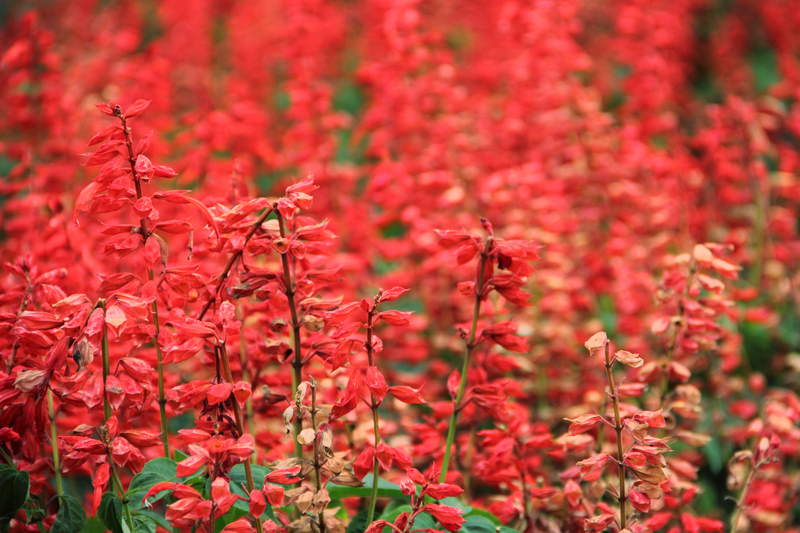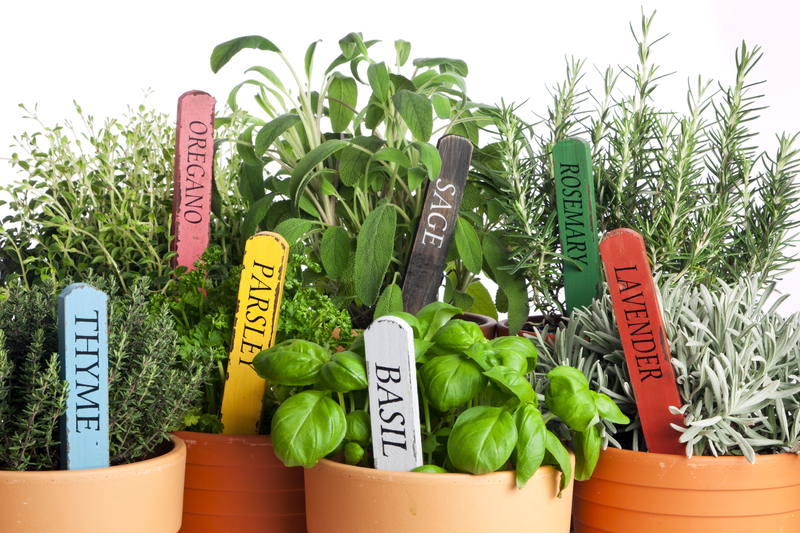Three Essential Tips to Master Weed Control
Posted on 15/08/2025
Three Essential Tips to Master Weed Control
Weeds can seem like the nemesis of every dedicated gardener, landscaper, or homeowner striving for a lush, healthy lawn or productive veggie patch. They compete for nutrients, sunlight, and water, undermining the beauty and health of your prized plants. However, the battle against weeds doesn't have to be a losing one. With the right approaches, you can master weed control and keep your outdoor spaces vibrant and weed-free. In this comprehensive guide, we'll uncover three essential tips to not just fight weeds, but effectively prevent and control them for the long haul.

Understanding the Fundamentals: Why Is Weed Control Important?
To master weed control, it's crucial to first understand what weeds are and why they're persistent. Weeds are typically defined as unwanted plants that grow vigorously, often faster than cultivated plants, and can quickly take over flower beds or lawns if left unchecked.
- Resource Competition: Weeds compete with desired plants for light, water, and nutrients, stunting the growth of your garden favorites.
- Spread of Pests and Diseases: Some weeds serve as hosts for harmful insects or plant diseases.
- Allergic Reactions: Certain invasive weeds can cause skin irritation or worsen allergic reactions for people and pets.
- Appearance: Weeds undermine the look of your yard or landscape, making maintenance more difficult and less rewarding.
Understanding these impacts reinforces the necessity of a weed management strategy. Now, let's dive into the three essential tips to transform your weed control results.
Tip 1: Prevent Weeds Before They Start
Why Prevention Is the Best Weed Control
An ounce of prevention is worth a pound of cure when it comes to effectively managing weeds. Stopping weeds before they germinate and spread is the single most efficient way to keep control manageable - and your garden beautiful.
Mulching: A Gardener's Secret Weapon
Mulch is more than just decorative--it's a key element in the smart gardener's arsenal. Here's why mulch is so effective at preventing weed growth:
- Blocks Sunlight: Most weed seeds need light to germinate. Mulch forms a physical barrier that blocks this essential ingredient, making it much harder for weeds to sprout.
- Retains Moisture: While helping retain needed moisture for your crops or flowers, mulch keeps the surface dry for weed seeds, making emergence unlikely.
- Soil Temperature Regulation: Consistent soil temperatures make it tough for weed seeds to find a niche.
Organic mulches, such as shredded leaves, straw, or wood chips, decompose over time and add nutrients to the soil, benefiting your garden weed control efforts twofold. Inorganic mulches like landscape fabric or gravel also work, especially in non-planting areas.
Proper Spacing & Dense Planting
Giving weeds nowhere to take hold is an underrated tactic. When you plan your garden, use spacing guides for each species, but consider, where possible, to grow plants close enough that their mature leaves will shade the soil.
- Cover Crops: In veggie gardens, use fast-growing cover crops (like rye or clover) during the off-season to outcompete weeds and add nutrients.
- Ground Covers: Ornamental ground covers within landscape beds shut out weeds with a living carpet of foliage.
Tip 2: Consistent, Hands-On Removal is Key
Hand-Pulling - The Timeless Method
Sometimes, there's simply no substitute for getting your hands dirty. Hand weeding remains one of the most precise forms of weed control, especially for garden beds or tight spots where tools or chemicals aren't ideal.
- Weed Early: Remove weeds as soon as you spot them--before they set seed or spread roots.
- After Rain: Pulling is easier when the soil is damp, which helps loosen the roots and lets you extract the entire plant.
- Root Removal: Pay special attention to removing as much of the root or rhizome as possible. Many weeds, such as dandelions or bindweed, can resprout from root fragments.
Use the Right Tools
There's a wide array of weed removal tools available. Knowing when and how to use each can save time and spare your back.
- Hoes: For larger beds and annual weeds, a sharp hoe can sever weeds at the soil line. Dutch hoes and collinear hoes are particularly good for this purpose.
- Weed Pullers or Extractors: For deep-rooted weeds, tools like dandelion diggers or claw weeders help unearth stubborn specimens without much soil disturbance.
Tip: Always clean and sanitize your tools if you notice diseased weeds to prevent spreading pathogens in your garden.
Regular Routine Is the Real Trick
The most effective gardeners and landscapers incorporate weed patrol into their weekly routine. Frequent, targeted weeding not only keeps the weed population low, but also makes each session much quicker and less exhausting than a neglected, overgrown patch.
Tip 3: Use Smart, Sustainable Chemical Solutions
Spot Treatments and Selective Herbicides
For large infestations or persistent perennial weeds, selective or non-selective herbicides can play a role in your weed management program. Here are some pointers for safely and effectively using weed control products:
- Identify the Weed: Know precisely what you're treating. Many herbicides are selective, targeting certain weed species while sparing turf or ornamentals.
- Spot Treat: Rather than blanket application, use a sprayer or dauber to target individual weeds and minimize chemical runoff or harm to non-target plants.
- Follow Labels: Adhere strictly to product instructions, application rates, and safety guidelines. Improper use can damage your garden or local ecosystem.
- Timing: Apply herbicides when weeds are actively growing, and avoid applying on windy days, near edible crops (unless label-approved), or just before rain.
Consider Natural and Organic Alternatives
Many gardeners prefer to keep their weed control methods eco-friendly, especially in edible gardens or around children and pets. There are several options for organic weed suppression:
- Homemade Solutions: Mixtures of vinegar, lemon juice, or boiling water can be applied directly to weed foliage. These work best on young or annual weeds.
- Organic Herbicides: Products made from plant oils, fatty acids, or natural acids offer alternatives to synthetic chemicals, though may require multiple applications.
- Flame Weeders: Propane-powered flame weeders are effective in driveways and paths for instantly killing weeds at the crown, without chemicals.
Integrated Weed Management (IWM)
Long-term weed mastery comes from integrated approaches. By combining physical, cultural, and chemical methods, you greatly reduce the dependence on any one technique and foster a resilient landscape.
- Rotate Methods: Alternate between hand weeding, mulching, mowing, and spot treatment to prevent weeds from adapting to a single control tactic.
- Encourage Healthy Soil: Fertile, balanced soil supports robust plant growth, making it tougher for weeds to invade.
- Maintain Lawn Height: For turf, keep grass slightly longer to shade out weed seeds and crowd out unwanted plants.
Common Questions About Weed Control Mastery
How Often Should I Weed My Garden or Lawn?
Consistent, weekly checks are ideal, especially during the active growth seasons of spring and summer. Early intervention makes weeds easy to manage and less likely to become a major problem.
Is Organic Weed Control as Effective as Chemical?
Organic methods are highly effective when used correctly and consistently. They work best when combined with preventive strategies, such as mulching and dense planting. For extremely tough or invasive species, targeted synthetic methods may be required but should be used sparingly and thoughtfully.
Can I Prevent Weeds Without Chemicals?
Absolutely! Many beautiful and productive gardens are kept weed-free with a combination of mulch, hand weeding, proper planting, and consistent maintenance. Layered approaches yield the best weed control results.
Bonus Tips for Complete Weed Control Success
- Maintain Edges: Install edging around beds and paths to create a barrier that stops spreading weeds from lawns or neighboring properties.
- Don't Compost Weed Seeds: Only compost weed-free plant material. Seeds in compost can reinfest your garden.
- Apply Pre-Emergent Herbicides: For lawns, consider pre-emergent herbicides in early spring to stop weeds like crabgrass before they start.
- Irrigation Control: Water only where needed--drip irrigation keeps garden beds hydrated without encouraging weed seeds between rows.

Your Path to Mastering Weed Control
Weed control is about working smarter, not harder. By focusing on prevention, consistent removal, and thoughtful (minimal) chemical use, you create a robust system for keeping weeds at bay. Each yard or garden is unique, and by combining these three essential strategies--prevention, regular removal, and sustainable treatments--you'll develop a time-saving, eco-friendly approach that leaves you with more time to enjoy your thriving, beautiful landscape.
Ready to master weed control in your garden? Start by evaluating your current practices, try the above tips, and stay committed to proactive maintenance. With these principles in hand, you'll see fewer weeds, healthier plants, and a landscape you're proud to show off--all year round.
Summary Table: Three Steps to Weed Control Mastery
| Tip | Key Actions |
|---|---|
| Prevention |
|
| Consistent Removal |
|
| Sustainable Solutions |
|
Conclusion: Mastering Weed Control Is Within Your Reach
Your path to mastering weed control starts today! Apply these three essential tips--prevention, regular weeding, and sustainable solutions--for a flourishing, weed-free landscape. Stay vigilant, adapt your techniques as your garden evolves, and celebrate your success in keeping weeds at bay. Your dream garden or lawn is just a few smart steps away.



